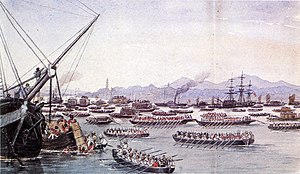Battle of Canton (May 1841)
| Second Battle of Canton | |||||||
|---|---|---|---|---|---|---|---|
| Part of the First Opium War | |||||||
 The British sailing towards the besieged city on 24 May |
|||||||
|
|||||||
| Belligerents | |||||||
|
|
|||||||
| Commanders and leaders | |||||||
| Hugh Gough |
Yishan Yang Fang |
||||||
| Strength | |||||||
| 6,000 | 45,000 | ||||||
| Casualties and losses | |||||||
| 15 killed 112 wounded |
1,000 killed 3,000 wounded |
||||||
| Casualties source: | |||||||
The Second Battle of Canton was fought between British and Chinese forces in Canton (Guangzhou), Guangdong province, China, in May 1841 during the First Opium War.
Canton was the only port in China open to foreign countries, mostly European, for trade under the Canton System. In the early stages of this commerce the demand in foreign countries for commodities including tea, silk and porcelain greatly outweighed Chinese needs for foreign products, and thus a significant trade imbalance developed. This unequal situation ended in the late 18th century when opium was shipped into China from plantations in India owned by the British East India Company. The number of people using the drug in China grew rapidly, to the point that the trade imbalance shifted in the foreign countries' favor. In 1839 matters came to a head when Chinese official Lin Zexu tried to end the opium trade altogether by destroying a large amount of opium in Canton, thereby triggering the First Opium War.
In response to Zexu's actions, in January 1841 the Royal Navy bombarded Chinese positions near Canton and landed troops ashore in several locations. Local officials surrendered and signed peace treaties with the British. When they brought these peace treaties to Beijing they were punished for their failures. The Qing Dynasty government refused to acknowledge the treaties, nor did they acknowledge any Chinese territory had been lost. Instead, they sent in more troops to drive back the British.
On May 21 Chinese forces attempted a night ambush on British positions in the hills to the north of Canton but were repelled.
...
Wikipedia
